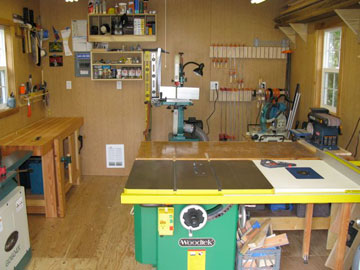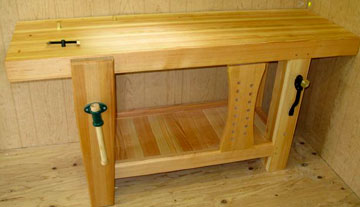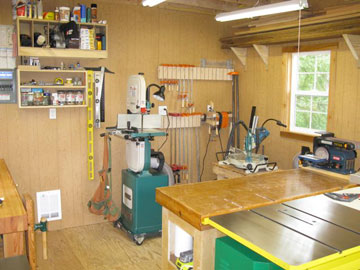Show Us Your Shop: The Man Cave
by Jim Gillette
Gig Harbor, Washington
 Located in the Pacific Northwest, my shop had its origin last March when I decided I needed
a separate building for my new woodworking hobby. I selected a 12 x 18 foot shop plan that matched my
home due to neighborhood regulations. I then worked hard on getting the most functionality out of
that size shop. The shop itself was one of my first major projects. The entire shop was built by me
with a little help from friends and family. I researched other small shops and tried to take
the best of each and incorporate them into my shop. The shop is powered by a 100 amp sub-panel with
currently 10 of the 12 20-amp circuits being used. The shop has electric heat and is lighted with
6 four-foot fluorescent fixtures. This seems to provide all the power, light and heat I need.
Located in the Pacific Northwest, my shop had its origin last March when I decided I needed
a separate building for my new woodworking hobby. I selected a 12 x 18 foot shop plan that matched my
home due to neighborhood regulations. I then worked hard on getting the most functionality out of
that size shop. The shop itself was one of my first major projects. The entire shop was built by me
with a little help from friends and family. I researched other small shops and tried to take
the best of each and incorporate them into my shop. The shop is powered by a 100 amp sub-panel with
currently 10 of the 12 20-amp circuits being used. The shop has electric heat and is lighted with
6 four-foot fluorescent fixtures. This seems to provide all the power, light and heat I need.
The heart of the shop is a work station that contains my WoodTek 3 HP cabinet saw with a
built-in router table similar to David Mark's setup. Behind the table saw I built a version of
Mac's Spagnuolo's assembly table. It serves dual functions as an outfeed table and assembly table.
I use the space below it to store some of my hand power tools. This is also where I set up my bench to
plane when needed. Its location in the center front third of my shop allows me to rip or plane
material up to 8 feet long by opening the shop's French doors and sliding my 14" Grizzly bandsaw
slightly to one side.
 The left side of the shop has a 6" Grizzly jointer and Chris Schwarz's design for a La Roubo
workbench that I just finished. The current jointer location allows me to joint material up to 48" long.
The jointer is equipped with a mobile base so if the material exceeds 48", I just pull it away from
the wall. The workbench is located next to a window to provide natural light and has most of my
hand tools to my front and right.
The left side of the shop has a 6" Grizzly jointer and Chris Schwarz's design for a La Roubo
workbench that I just finished. The current jointer location allows me to joint material up to 48" long.
The jointer is equipped with a mobile base so if the material exceeds 48", I just pull it away from
the wall. The workbench is located next to a window to provide natural light and has most of my
hand tools to my front and right.
 At the front entrance of the shop is a mobile cabinet that I built to hold a bench top drill press
that also has dual functions as a oscillating spindle sander. The lower section of the cabinet was
built to hold my Ryobi 13" planer, which I just pull out and position on the outfeed table when
needed. Everything in the shop is easily connected to my Delta 1.5 HP dust collector located in the
front right corner of the shop. I use a system of flexible and metal ducting to provide 3 dust
collection hook-ups for my machines, switching from tool to tool as necessary. At some point in
future I'll install more permenant ducting so that each tool has a dedicated connection.
At the front entrance of the shop is a mobile cabinet that I built to hold a bench top drill press
that also has dual functions as a oscillating spindle sander. The lower section of the cabinet was
built to hold my Ryobi 13" planer, which I just pull out and position on the outfeed table when
needed. Everything in the shop is easily connected to my Delta 1.5 HP dust collector located in the
front right corner of the shop. I use a system of flexible and metal ducting to provide 3 dust
collection hook-ups for my machines, switching from tool to tool as necessary. At some point in
future I'll install more permenant ducting so that each tool has a dedicated connection.
 On the rear right side of the shop is my wood storage along with my Makita 10" sliding mitersaw. This allows
me to efficiently cut material down to more workable sizes before I have to move them around the shop.
The mitersaw table is lowered to allow the outfeed table to help support my work. On the back wall
of the shop is my clamp storage. I found this design in Fine Woodworking magazine. It allows easy access to
all my clamps and I like the way it displays them. Also on the back wall is my 1.5 HP 14" Grizzly
bandsaw. It also incorporates a mobile base for easy movement when necessary. Its location seems to work
well though with the direction of cut across the shop.
On the rear right side of the shop is my wood storage along with my Makita 10" sliding mitersaw. This allows
me to efficiently cut material down to more workable sizes before I have to move them around the shop.
The mitersaw table is lowered to allow the outfeed table to help support my work. On the back wall
of the shop is my clamp storage. I found this design in Fine Woodworking magazine. It allows easy access to
all my clamps and I like the way it displays them. Also on the back wall is my 1.5 HP 14" Grizzly
bandsaw. It also incorporates a mobile base for easy movement when necessary. Its location seems to work
well though with the direction of cut across the shop.
All extra space on the walls is used for storage of some sort. Everything has its place so nothing is
on my work table unless I'm using it. Because of the small size of the shop, it's not hard to get
things out or put them back. That's part of the beauty of a small shop. Everything has its place and that
that place is usually only a few steps away. I have really enjoyed working out the functionality of
the shop and continue to fine tune it. I have enjoyed having a space to call my own, which is
affectionally known as "The Man Cave."
Return to
Wood News
front page
